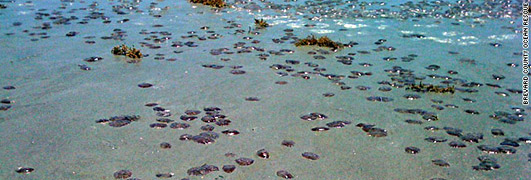Jellyfish Invade FL Beaches: The Sting of Climate Change
Posted August 28, 2014 07:45 am

NEW SMYRNA BEACH, Fla. - This Labor Day weekend, thousands of Floridians and visitors may feel more than just the sting of a sunburn. Jellyfish are hanging around beaches, with at least 400 people stung last weekend alone. While the toxin-tentacled animal has long been a part of beach-life, "jellyfish blooms" are becoming more common due to warming temperatures at the water surface and other factors related to climate change.
 Billy
Causey is regional director of NOAA's Office of National
Marine Sanctuaries.
Billy
Causey is regional director of NOAA's Office of National
Marine Sanctuaries.
"What this is telling us is that something is not
right in our ocean," Causey says. "It's a symptom of a
sick ocean. It's a symptom of pollution. It's a symptom
of elevated sea-surface temperatures."
Jellyfish are just one of the "pests" listed in a new
report released by the National Wildlife Federation
(NWF). Ticked
Off: America's Outdoor Experience and Climate Change found
that a variety of pests - including fire ants, stink
bugs, ticks and mosquitoes - are proliferating as the
climate changes.
Dr. Doug Inkley authored the NWF report and says there
is mounting evidence of a warming climate and the
negative impacts associated with it.
"It's not our imagination, this is already happening,"
Inkley says. "We must take action now, for our
children's future and for our outdoor experience
future."
Algal blooms, according to the report, are another
consequence of warming waters. Earlier this month, a
"red tide" impacted parts of the Florida coast. Causey
says reports like this one from the NWF serve to
"connect the dots" of climate change and human behavior,
something he says has not been done up until this point.
"We've seen declines in fisheries. We've seen declines
in various areas, but what we haven't done is really
link human pollution to the health of the ocean," says
Causey.
The NWF report recommends carbon-emission limits for
existing power plants, which the Environmental
Protection Agency plans to implement by June of next
year. Increasing energy efficiency and investing in
clean-energy sources are two other recommendations in
the report.
Photos/graphics and
links added by the Observer | image:Brevard County Ocean
Rescue
This piece was reprinted by the Columbia County Observer with permission or license. It may not be reproduced in any form without permission or license from the source.
